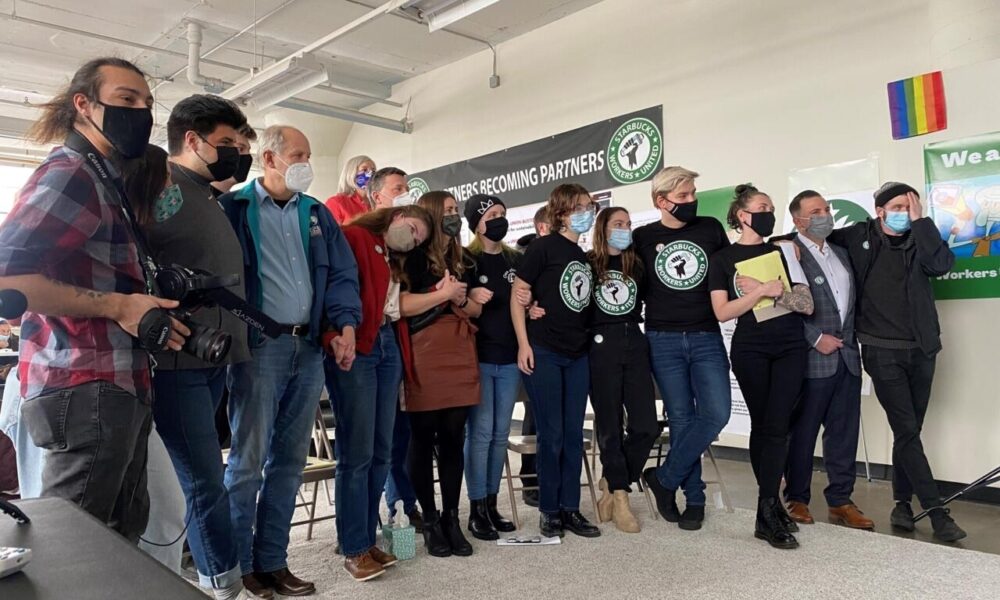International
Fledgling union efforts at Amazon, Starbucks dig in for long fight
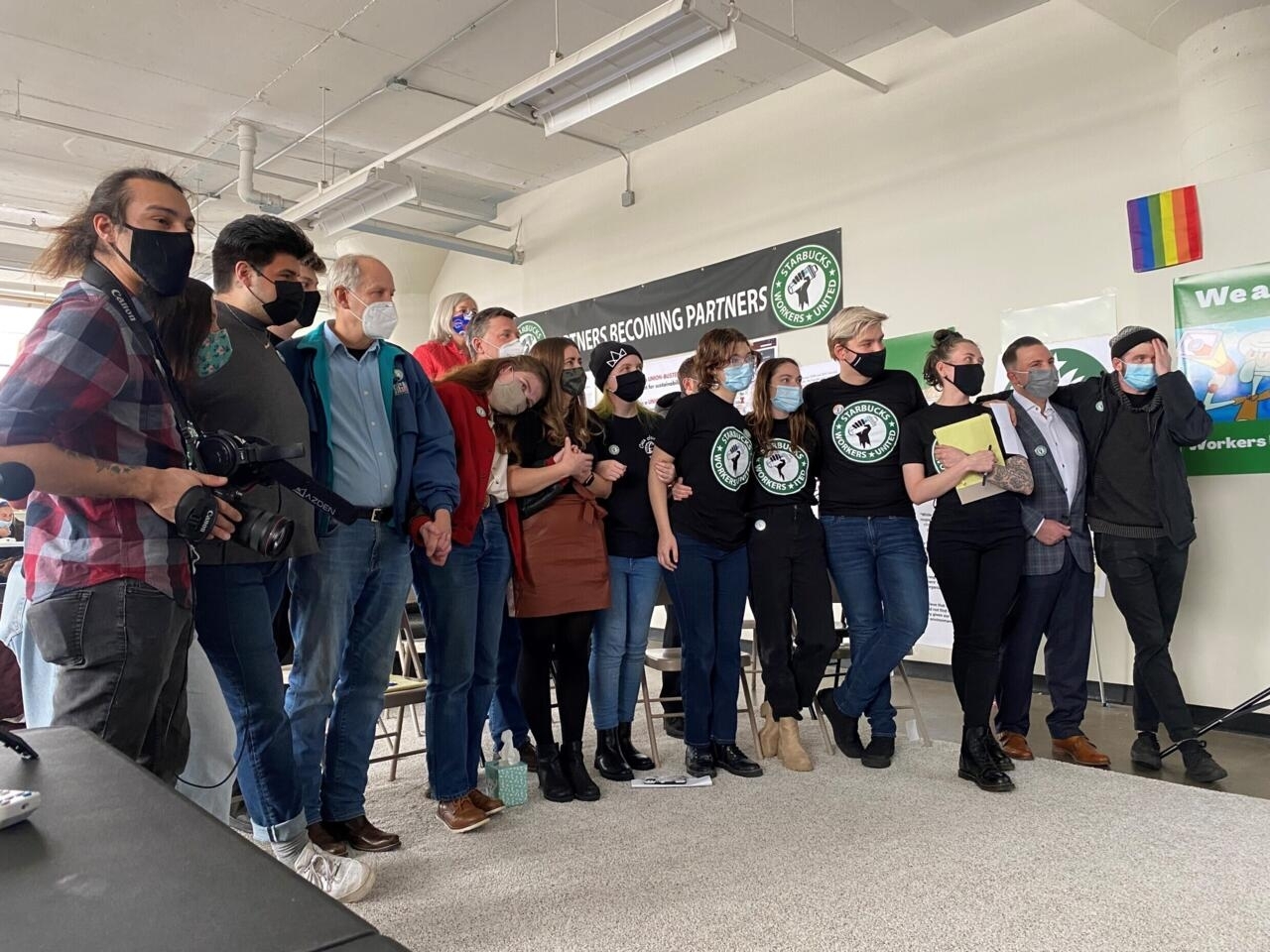
AFP | Juliette Michel
Recent unionization drives at Starbucks and Amazon have lifted morale in the US labor movement, but organizers have yet to transform election victories into material change.
Moreover, some union backers such as Will Westlake have paid a price for their activism.
Formerly a Starbucks barista in Buffalo, New York, where the initial union votes took place in December 2021, Westlake was fired earlier this month — ostensibly for not removing a suicide prevention badge from his apron, which he has viewed as an expression of his solidarity with the movement.
But Westlake thinks his firing was payback for his union activism.
“I was number 123” on the list of Starbucks employees to lose their jobs as the campaign has spread to some 250 cafes nationwide, said Westlake.
Starbucks declined to comment on allegations from Starbucks Workers United that the company fired workers for union activism.
But such reprisals at US companies are “pretty routine in this country,” said Ruth Milkman, a sociologist at CUNY in New York.
Young activists
Milkman counts herself among the experts in labor relations who have been surprised at the spread of the union drives to a growing slate of corporations, including Apple, REI, Chipotle and Trader Joe’s — companies that union organizers have not in the past viewed as fertile to their efforts.
“This was kind of a different moment,” said Milkman of a period defined by a labor shortage, the pandemic and “a young labor force frustrated by their limited labor market options.”
US officials have seen a 53 percent jump in the number of union elections over the last year, according to the National Labor Relations Board.
But that increase takes place against the backdrop of a longtime decline in organized labor since the 1980s, with fewer than 10 percent of private-sector employees now unionized.
While union backers have won some high-profile election victories over the last year, in many cases, the successful votes have taken place at small establishments, such as an individual Starbucks cafe.
What’s more, “winning the election is actually the easy part,” said Cedric de Leon, a sociologist at the University of Massachusetts at Amherst.
“The hard part is to negotiate the contract,” he said. “And there is nothing the government can really do to force the employers to negotiate in good faith.”
While two Starbucks cafes in Buffalo voted to unionize last December, the first meeting with management on the contract will take place only this month.
The outlook is even murkier at the Staten Island, New York warehouse that in April became the first Amazon site in the United States to unionize.
But Amazon is contesting the vote, alleging improprieties.
Commenting on a union election now taking place at an upstate New York warehouse, an Amazon spokesman said this week that the company will continue to fight the Staten Island election outcome because “we don’t believe it represents what the majority of our team wants.”
Culture of intimidation
Under the Biden administration, the NLRB has for its part cracked down on some anti-union conduct by big corporations, as with a complaint earlier this month against Apple after the company prevented the distribution of union fliers in a break room.
In August, a US judge ordered Starbucks to reinstate seven employees that the NLRB found were unlawfully fired by the coffee giant.
Such moves by companies represent an effort to instill in workers “a culture of fear and intimidation,” said de Leon, noting that support from President Joe Biden and other political leaders will not be enough to make real change.
But “250 Starbucks going out on a nationwide strike, that could be decisive,” he said.
The recent wave of union campaigns has come amid a tight labor market in a period of elevated consumer demand. A recession would alter some of those dynamics, although de Leon notes that previous economically weak periods such as the 1930s and 1970s have boosted unions.
Westlake said he is determined to hold companies like Starbucks to account.
“They are hoping that the public won’t care enough and that in two or three years, they will be able to fire all the union leaders and crush the union,” said Westlake, who has filed a complaint with the NLRB over his dismissal.
International
Japan reopens Kashiwazaki-Kariwa Plant despite public concerns
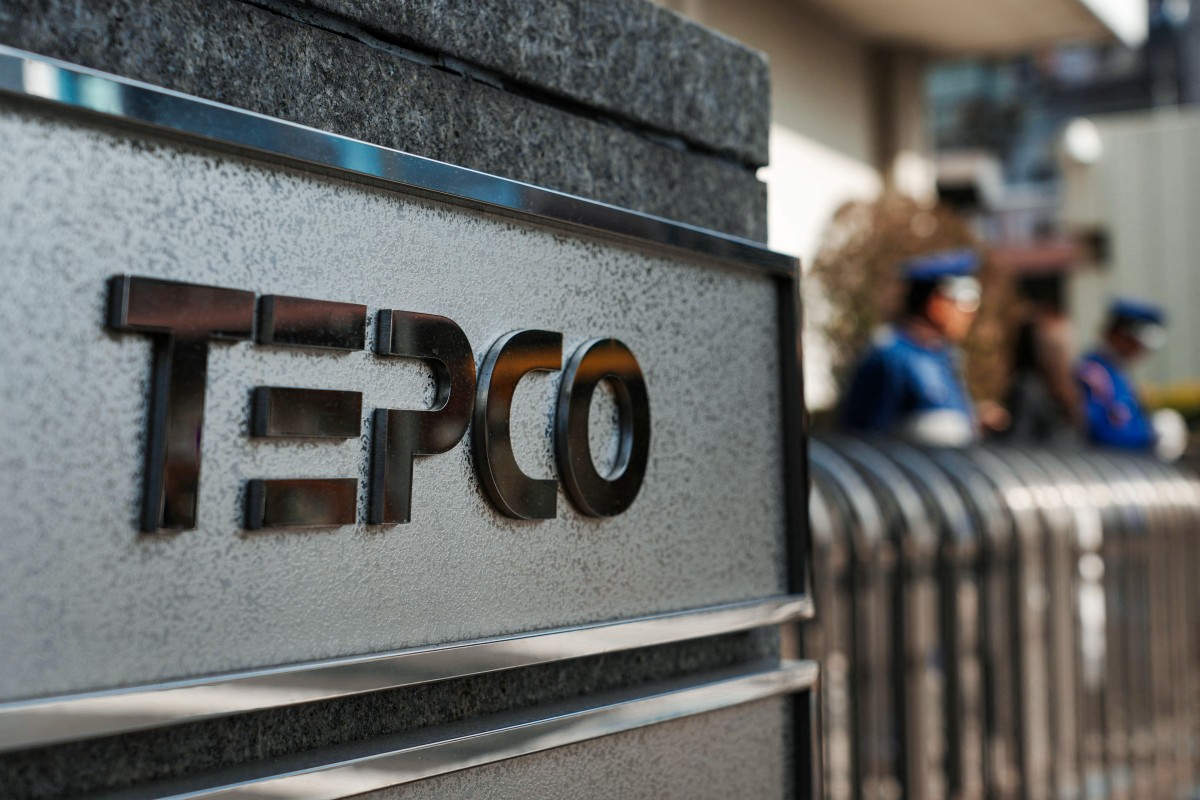
La centrale nucléaire japonaise de Kashiwazaki-Kariwa, la plus grande au monde, a repris ses activités mercredi pour la première fois depuis la catastrophe de Fukushima en 2011, malgré les inquiétudes persistantes d’une partie de la population.
La remise en service a eu lieu à 19h02 heure locale (10h02 GMT), a indiqué à l’AFP Tatsuya Matoba, porte-parole de la compagnie Tokyo Electric Power (Tepco).
Le gouverneur de la préfecture de Niigata, où se situe la centrale, avait donné son feu vert à la reprise le mois dernier, en dépit d’une opinion publique divisée. Selon une enquête menée en septembre par la préfecture elle-même, 60 % des habitants se déclaraient opposés au redémarrage, contre 37 % favorables.
Mardi, plusieurs dizaines de manifestants ont bravé le froid et la neige pour protester près de l’entrée du site, sur les rives de la mer du Japon.
« L’électricité de Tokyo est produite à Kashiwazaki. Pourquoi seuls les habitants d’ici devraient-ils être exposés au danger ? Cela n’a aucun sens », a déclaré à l’AFP Yumiko Abe, une riveraine de 73 ans.
La centrale de Kashiwazaki-Kariwa avait été mise à l’arrêt lorsque le Japon a fermé l’ensemble de ses réacteurs nucléaires à la suite du triple désastre de mars 2011 — un séisme, un tsunami et un accident nucléaire — survenu à Fukushima.
International
Markets rise as Trump halts Europe tariffs and floats Greenland agreement framework
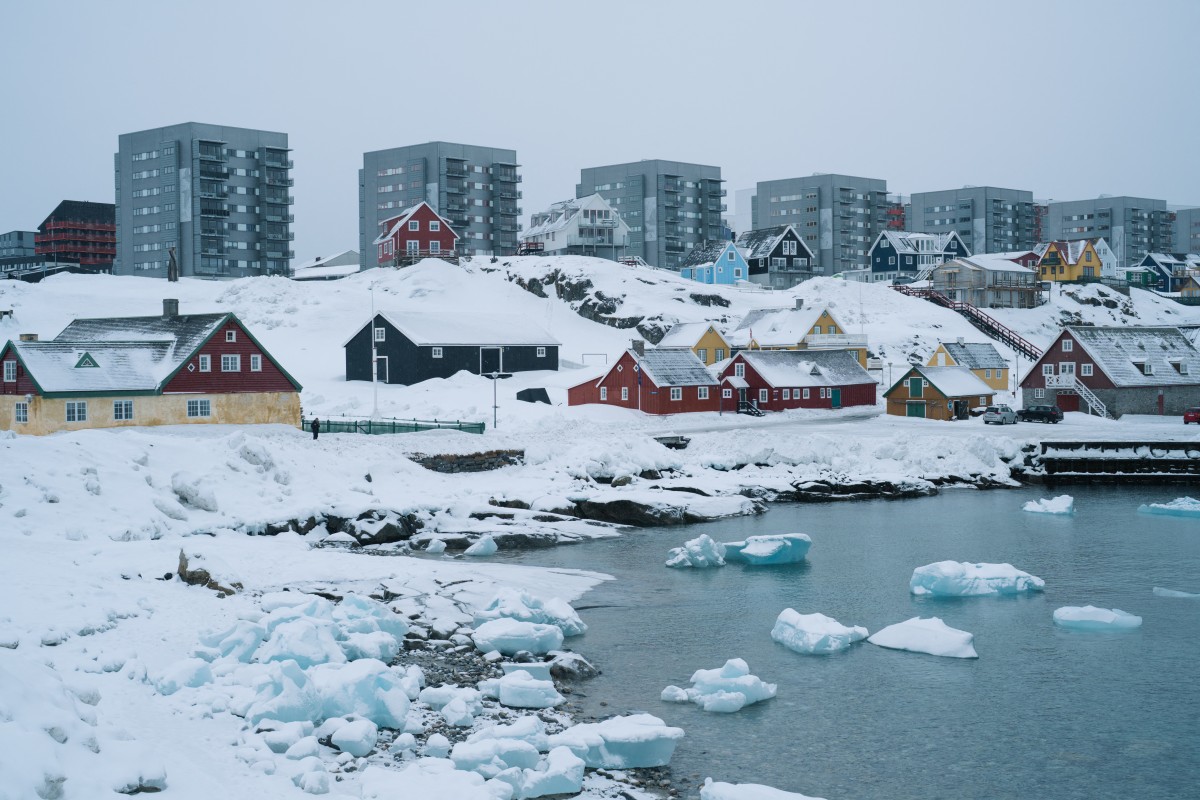
U.S. President Donald Trump on Wednesday lifted his threat to impose new tariffs on several European countries and said he had outlined the framework of a future agreement on Greenland during a meeting in Davos with NATO Secretary General Mark Rutte.
“Based on this understanding, I will not impose the tariffs that were scheduled to take effect on February 1,” Trump wrote on his social media platform Truth Social, without providing details about the proposed “framework.”
The announcement boosted financial markets. Wall Street, which had been trading slightly higher, extended its gains following Trump’s message, while the U.S. dollar strengthened against the euro.
Trump has repeatedly insisted that Greenland, rich in mineral resources, is ‘vital’ to the security of the United States and NATO, particularly as Arctic ice melts and global powers compete for strategic advantage in the region amid rising tensions with China and Russia.
Last week, the U.S. president threatened to impose tariffs of up to 25% on eight European countries for supporting Denmark and sending a military exploratory mission to Greenland. All of the targeted countries are NATO members, including the United Kingdom, Germany, and France, Europe’s largest economies.
Trump said on Wednesday that additional discussions are underway regarding the “Golden Dome” missile defense system, specifically in connection with Greenland.
He assigned Vice President JD Vance, Secretary of State Marco Rubio, and special envoy Steve Witkoff to lead the negotiations.
Hours before his post, Trump ruled out the use of force to seize Greenland for the first time, but demanded “immediate negotiations” for its acquisition, reiterating his view that only the United States can guarantee the security of the Arctic island.
International
Venezuela’s interim president predicts 37% increase in revenues for 2026
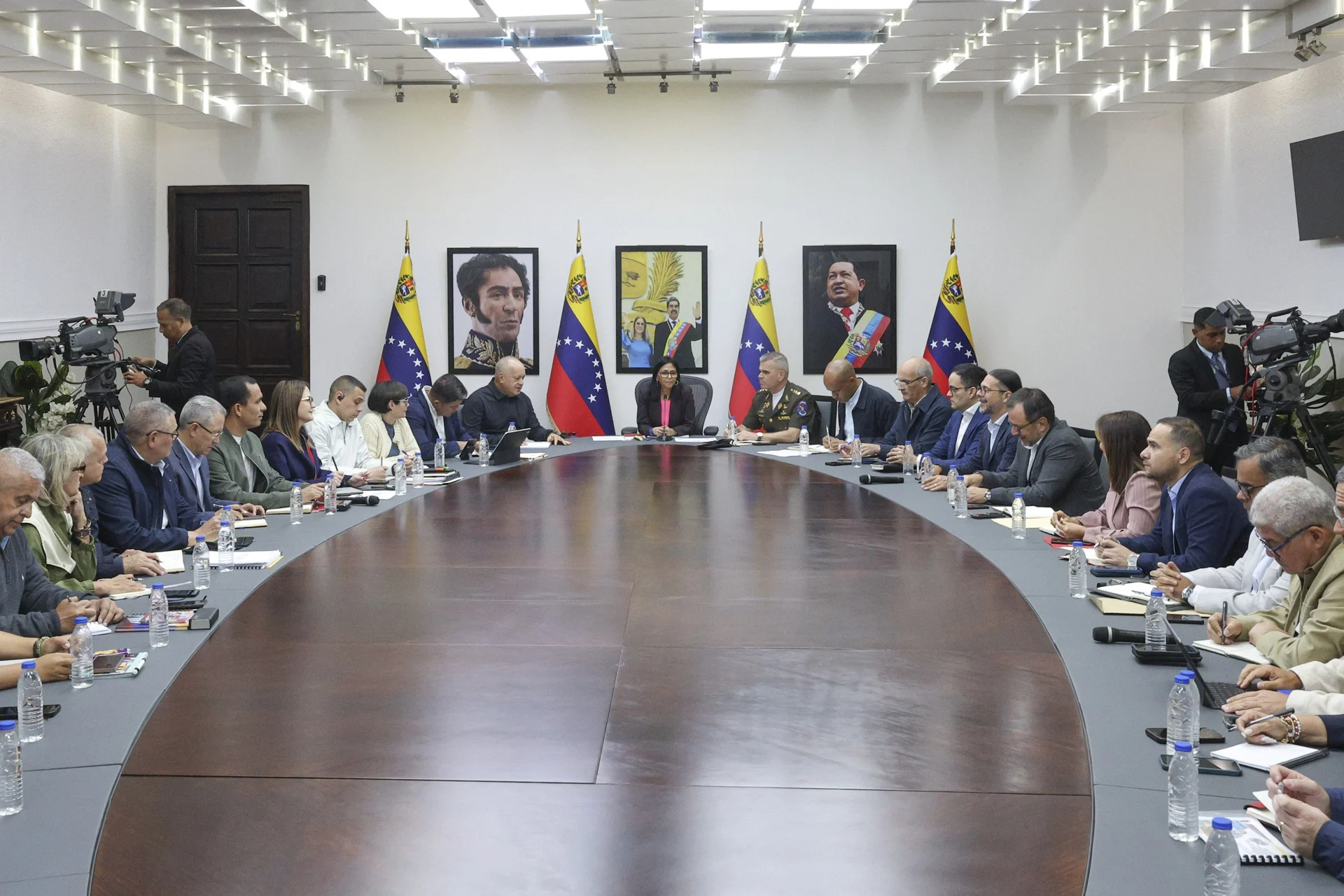
Venezuela’s interim president, Delcy Rodríguez, said Wednesday that the country’s revenues are expected to increase by about 37% in 2026, in a statement made during a session of the Federal Government Council at the Miraflores Presidential Palace in Caracas.
Rodríguez said the projected rise in foreign currency income comes as agreements on Venezuelan oil sales with the United States are being implemented, including deals in which Washington will trade Venezuelan crude and manage the proceeds before transferring funds to Caracas.
“This year, revenues expressed in foreign currency will increase by 37%,” Rodríguez declared, according to EFE. She noted that the increase will also benefit regional governments and local authorities. “You will have more resources for your management, which I know you need,” she added.
Rodríguez said the distribution formula for revenues will remain the same as in 2025: 53% for communes, 29% for state governments, 15% for municipalities, and 3% for institutional strengthening. She also said the government would intervene to “correct imbalances” in how funds are allocated, particularly among some municipal and regional authorities.
The announcement follows reporting that Venezuela received at least $300 million from oil revenues tied to a U.S.–Venezuela deal that could involve up to 50 million barrels of crude. Washington officials have said the interim government met U.S. requirements under the agreement.
-

 Central America4 days ago
Central America4 days agoGuatemala raises police death toll to nine after gang violence escalates
-

 International4 days ago
International4 days agoDeath toll from southern Spain train crash rises to 40
-

 International2 days ago
International2 days agoMexican influencer “La Nicholette” kidnapped in exclusive area of Culiacán
-

 International3 days ago
International3 days agoDaily Mail publisher insists reports relied on legitimate sources amid privacy trial
-

 International4 days ago
International4 days agoOver 160 christian worshippers kidnapped in Kaduna Church attacks
-

 International3 days ago
International3 days agoGermany says football bodies alone will decide on possible World Cup boycott
-

 International2 days ago
International2 days agoMajor winter storm to blanket U.S. and Canada with snow, ice and arctic cold
-

 International2 days ago
International2 days agoTrump announces preliminary NATO agreement on Greenland, suspends tariffs on Europe
-

 Central America1 day ago
Central America1 day agoMazatenango Carnival cancelled amid State of Siege in Guatemala
-

 International1 day ago
International1 day agoMarkets rise as Trump halts Europe tariffs and floats Greenland agreement framework
-

 International4 days ago
International4 days agoSpain’s Prime Minister pledges transparency after train crash kills at least 39
-

 International1 day ago
International1 day agoVenezuela’s interim president predicts 37% increase in revenues for 2026
-
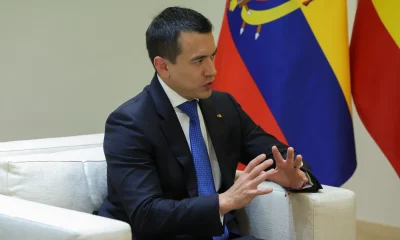
 International2 days ago
International2 days agoColombia slams Ecuador’s 30% tariff as ‘economic aggression’
-

 International1 day ago
International1 day agoTrump to invite Venezuela’s interim president Delcy Rodríguez to Washington
-

 International1 day ago
International1 day agoJapan reopens Kashiwazaki-Kariwa Plant despite public concerns
-

 International1 day ago
International1 day agoFour minors killed in deadly clash between FARC dissidents in Colombia’s Amazon
-
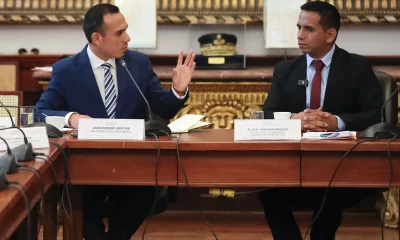
 International2 days ago
International2 days agoJosé Jerí claims destabilization attempt after videos of secretive meetings surface













